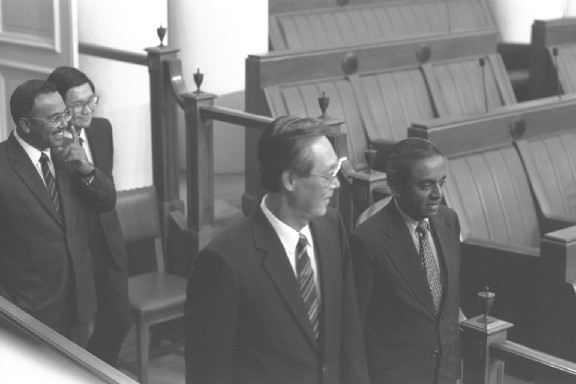THE JAYAKUMAR SPEECH THAT CHANGED THE WAY WE LAWYER
The Solidarity, Unity and Resilience budgets of this year may strike some as the first time that the Government has named its national spending plans. But that’s not entirely true; some 30 years ago, Parliament was debating a very different national spending plan, one that then-Finance Minister Dr Richard Hu had dubbed "the Shenton Way Budget".
It drew much attention for its many tax incentives that aimed to propel the flourishing financial sector. But alongside its bevy of fiscal stimulants, the plan also promised a bold innovation for an age-old sector.
THE LEGAL PROFESSION’S ‘GAME-CHANGER’
Few expected then-Minister of Law and Home Affairs Professor S Jayakumar to use his time on the floor to speak of revolution; but he did, announcing a “revolution in legal services”. This revolution would not be brought about with blood or protests, but bytes and programmes: an ambitious computerisation effort that would ultimately become the LawNet so many know — and rely on — today.
The announcement of the programme was a response to the Chairman of the Government Parliamentary Committee for Law and Home Affairs Dr Arthur Beng’s concerns that a fast-expanding and digitising legal sector would lead to lawyers operating under different agencies and systems. This could make information retrieval a painful and time-consuming effort for the entire profession.
So the remedy put forth by Prof Jayakumar seemed fitting: LawNet, he said, would become a “one-stop service by providing a single window into all the various laws and legal information required in law practice.” And to facilitate the effort, a council would be formed to “provide a national umbrella … to integrate and coordinate these computerisation efforts in the entire legal sector”.
Although the announcement was made during the Budget debate, LawNet had already been in the works for about a year. But wider computerisation efforts extend as far back as to 1981. But of course, the efforts didn’t stop there. Soon, the legal sector envisioned an even bigger transformation: to computerise not just parts of, but the entire legal sector.
30 years on, LawNet has achieved just that. It sees Singapore’s resources collated, catalogued and made accessible to users on a single site. Not all revolutions take place with a moment history marking change. Some happen across years, working beneath the surface, taking measured steps towards its goal. LawNet, as Professor Jayakumar foresaw, is rightly one of them.
“Never be stagnant” may be a fitting description of Singapore’s legal system, which remains keenly attuned to society’s shifting needs surrounding justice. Since its inception 30 years ago, LawNet has been a committed partner to this process. By evolving and refining its services, it has been key to the digitisation of Singapore’s legal system, while also cementing the Republic as a global legal research hub.
In the coming year, the Singapore Academy of Law, which runs and manages LawNet, will tell the stories of the people behind, in the centre of and for whom LawNet was envisioned. We’ll also share our future plans for the portal as our legal system approaches another chapter in its liveried history.
Join us as we tell these tales of yesterday and visions for tomorrow; and tell us yours as well by using #LawNet30 on social media.







